
Gordon Meredith Lightfoot Jr. was a Canadian singer-songwriter and guitarist who achieved international success in folk, folk-rock, and country music. He is credited with helping to define the folk-pop sound of the 1960s and 1970s. He has been referred to as Canada's greatest songwriter, having several gold and multi-platinum albums and songs covered by some of the world's most renowned musical artists. Lightfoot's biographer Nicholas Jennings said, "His name is synonymous with timeless songs about trains and shipwrecks, rivers and highways, lovers and loneliness."

John Benson Sebastian (born March 17, 1944) is an American singer, songwriter and musician who founded the rock band the Lovin' Spoonful. He made an impromptu appearance at the Woodstock festival in 1969 and scored a U.S. No. 1 hit in 1976 with "Welcome Back."

Lightfoot! is the debut album by Canadian singer-songwriter Gordon Lightfoot. Although it was recorded in December 1964, the album was not released until January 1966 on the United Artists label.

The Way I Feel is the second studio album by Canadian singer-songwriter Gordon Lightfoot, originally released in 1967 on the United Artists label.
Psychedelic folk is a loosely defined form of psychedelia that originated in the 1960s. It retains the largely acoustic instrumentation of folk, but adds musical elements common to psychedelic music.
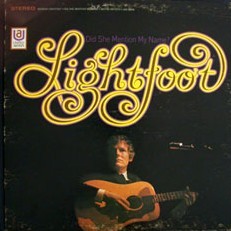
Did She Mention My Name? is Canadian singer Gordon Lightfoot's third studio album, released in 1968 on the United Artists label. The album marked Lightfoot's first use of orchestration.

Sit Down Young Stranger is Canadian singer Gordon Lightfoot's sixth original album and his best-selling original album. Shortly after its 1970 release on the Reprise Records label, it was renamed If You Could Read My Mind when the song of that title reached #1 on the RPM Top Singles chart in Canada and #5 on the Billboard Hot 100 in the US. The album itself reached #12 on the Billboard 200 chart. In Canada, the album was on the charts from April 18, 1970, to November 27, 1971. It peaked at #8 on March 13, 1971 after an earlier peak at #12 on June 20, 1970. Its last 24 weeks were spent in the 90s, except for two appearances at #88 and one at #100.

Sunday Concert is Canadian singer Gordon Lightfoot's first solo live album, released in 1969 on the United Artists label. Lightfoot's last recording for United Artists, it was also his first live album and until the release of a live DVD in 2002 remained Lightfoot's only officially released live recording. The album was recorded at Massey Hall in Toronto.
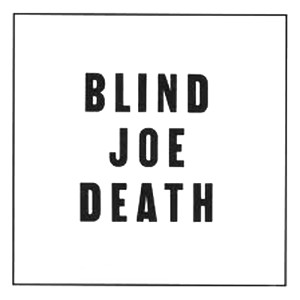
Blind Joe Death is the first album by American fingerstyle guitarist and composer John Fahey. There are three different versions of the album, and the original self-released edition of fewer than 100 copies is extremely rare.
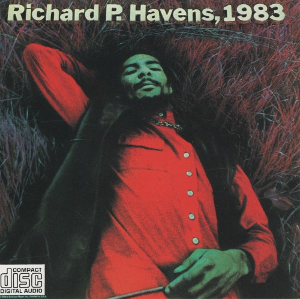
Richard P. Havens, 1983 is a 1968 double album set by folk rock musician Richie Havens featuring a combination of studio recordings and live material recorded in concert during July 1968. The album combined original material with several of the covers for which Havens was known. Notable songs include the singles "Stop Pushing and Pulling Me" and "Indian Rope Man", the latter of which has been multiply covered under its own name and in retooled identity as "African Herbsman." The genre-bending album was critically and commercially well-received, reaching #80 on the Billboard "Pop Albums" chart. Initially released on the Verve label, it has been reissued multiple times in various formats, including by Verve subsidiary Verver Forecast/PolyGram and Australian label Raven Records. It has also been compiled with albums Mixed Bag and Something Else Again in multi-cd set Flyin' Bird: The Verve Forecast Years on the Hip-O Select/Universal label.

If I Were a Carpenter is an album by American singer Bobby Darin, released in 1966. It was a significant change in direction for Darin considering his previous album was a collection of show tunes.

Evergreen, Vol. 2 is the second album from the Stone Poneys, released five months after The Stone Poneys. It was the most commercially successful of the Stone Poneys' three studio albums.

The Stone Poneys is the debut studio album by the Stone Poneys; other than the single of "So Fine" in 1965, this album marks the first official recordings by Linda Ronstadt.
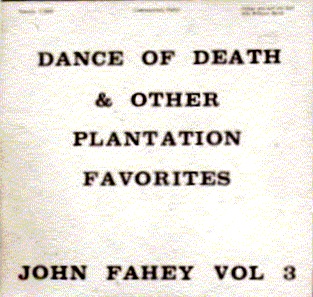
The Dance of Death & Other Plantation Favorites is the third album by American fingerstyle guitarist and composer John Fahey, released in 1965. The 1999 reissue contained four previously unreleased tracks.
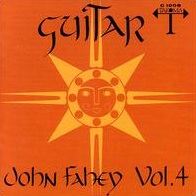
The Great San Bernardino Birthday Party & Other Excursions is an album by American fingerstyle guitarist and composer John Fahey, released in 1966. The cover simply labels the album Guitar Vol. 4 while the liner notes label it The Great San Bernardino Birthday Party & Other Excursions. The title never appeared on the record labels themselves. It marked the beginning of Fahey's interest in his recording of experimental soundscapes and sound effects. Despite Fahey's distaste for the 1960s counterculture, it is his release most often referred to as psychedelic.

After the Ball is an album by the American folk musician John Fahey, released in 1973. It was his second and last recording on the Reprise label and like its predecessor, Of Rivers and Religion, it sold poorly.

Here's the Answer is the second studio album by American country artist Skeeter Davis. The album was released in January 1961 on RCA Victor Records and was produced by Chet Atkins. The album consisted of cover versions of hit singles by country artists and answer songs to the hits.

H. P. Lovecraft II is the second album by the American psychedelic rock band H. P. Lovecraft and was released in September 1968 on Philips Records. As with their debut LP, the album saw the band blending psychedelic and folk rock influences, albeit with a greater emphasis on psychedelia than on their first album. H. P. Lovecraft II failed to sell in sufficient quantities to reach the Billboard Top LPs chart or the UK Albums Chart, despite the band being a popular act on the U.S. psychedelic concert circuit. Legend has it that the album was the first major label release to have been recorded by musicians who were all under the influence of LSD.

Close is a solo album by American rock musician Sean Bonniwell, credited under the moniker T. S. Bonniwell, who had been the creative force behind the innovative garage rock band The Music Machine. The album was released on August 4, 1969, by Capitol Records. It marked a total departure from Bonniwell's rebellious protopunk period with The Music Machine, to a soft rock crooning style. In addition, the album blended folk rock and orchestrated influences, and was inspired by Bonniwell's stints in the pre-Music Machine groups, the Wayfarers and the Ragamuffins, along with his desire to be more poetically inclined. The song,"Where Am I to Go", was released as a single ahead of the album, but failed to chart. Like its attendant single, Close was also somewhat commercially unsuccessful, and was the last recording by Bonniwell for the next 20 years.

The Remains is the debut album by the American garage rock band the Remains, and was released on Epic Records in September 1966. Though the album was largely overlooked at the time of its original release, The Remains has since received recognition as one of the more cohesive efforts of the era.
















